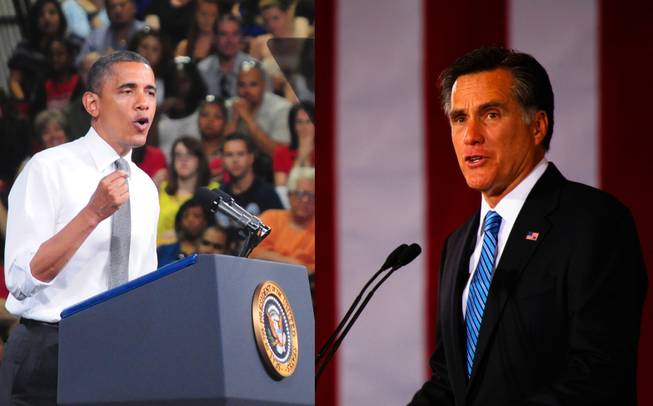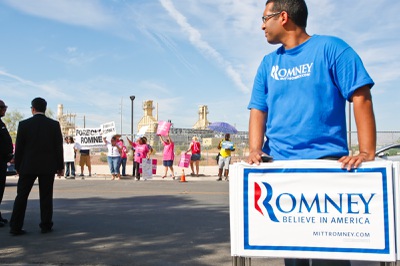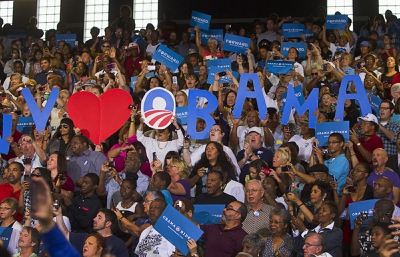
President Barack Obama and GOP challenger Mitt Romney
Wednesday, Oct. 3, 2012 | 2 a.m.
Sun coverage
HIGHLANDS RANCH, Colo. — From the glittering lights of Nevada casinos to the magnificent vistas and booming tech corridor of Colorado, the wide open spaces, big skies — and big aspirations — of Western voters on both sides of the aisle have taken center stage in the 2012 presidential election.
As President Barack Obama and Republican Mitt Romney prepare to meet today at the University of Denver for their first face-to-face debate, the candidates have lavished attention and resources on the two crucial Western swing states that could shape the outcome of the race.
With fewer than 40 days left until the election, the economy and jobs reign as the lead issues in the race. But the increased western attention also has raised the profile of issues of particular interest to the region’s voters. Those include immigration and energy — oil, coal, natural gas and alternative energy production — along with gun rights and even the legalization of marijuana, an issue facing Colorado voters on the November ballot. Also looming large is the housing slump — Nevada leads the nation in foreclosures, and Colorado ranks No. 8 in the nation.
The increasingly frenzied campaign focus on the West is being played out in communities such as Highlands Ranch, an affluent Denver suburb. The sun barely was up recently, and a breakfast meeting of the local Republican Party was packed with activists pumped on coffee and election fervor.
The complaint among Republicans in Douglas County, which ranks as one of the top conservative bastions in the nation: There aren’t enough Mitt Romney yard signs to meet all the demand.
Colorado GOP icon Bob Breaprez — a dairy farmer, former U.S. congressman and gubernatorial candidate — said he’s been traveling the breadth of his native swing state, and “I haven’t seen one Obama sign.”
“Something’s happening out there in Douglas County, and Jefferson County, and Arapahoe County,” Breaprez told his fellow Republicans, referencing some of the most hotly contested and fastest-growing regions in Colorado, as heads nodded in agreement. “There’s not the intensity with Barack Obama’s constituents. ... It’s still a jump ball.”
Mark Baisley, a former Southern California aerospace professional who is now chairman of the Douglas County GOP, said Republicans in the region — dubbed by some “the center of conservative gravity” in the Rocky Mountain state — represent a range of small business folks, lawyers, professionals and even some ranchers, many hard hit by the recession.
“We’re Westerners, in the true sense,” he said. “It’s rugged individualism that is lived out here in a big way. When the government is attempting to do for us, we find that oppressive. We just want them to leave us alone.”
But a few miles away in urban Denver, Alvina Vasquez, 33, the communications director of Campaign for a Strong Colorado, a progressive grass-roots organization, said Latinos in the region also have aspirations — the opportunity to work, realize dreams, educate children and reach for opportunity without interference or roadblocks.
“Those are Western values,” she said. “What is Mitt Romney offering them? Self-deportation.”
Lauren Haber, a 22-year-old senior at UNR, acknowledged that in her crucial swing state of Nevada, this election looks different from four years ago, when thousands of students were engaged by the possibility of choosing the first black president.
She admits there aren’t as many bumper stickers, nor Obama’s iconic image on T-shirts and posters, around her 18,227-student campus. Still, she said, she will again vote for Obama.
“His views on social issues like abortion and gay marriage are right in tune with mine,” she said. “(We) share the same values and core beliefs.”
But sitting inside an upscale horse trailer they were showcasing at a western trade show at the Reno Livestock Events Center, Josh Motley adjusted his cowboy hat as he complained that Obama was perpetuating an entitlement society.
“I was raised that if you want something, make it happen,” he said. “Don’t wait for somebody to hand it to you.”
Times were tough in his business for the previous three years, “and there were times when I paid my employee, but I didn’t take any money,” Motley said. That’s the ethic he learned growing up on a working ranch in Colorado. He now lives in Fort Morgan, 80 miles outside of Denver.
He criticized Obamacare, saying it has frozen a lot of business investments. His business has picked up in the past year, but he doesn’t attribute any of that to Obama.
“It wasn’t anything he did,” said Motley, who supports Romney.
Recent polls confirm the West’s divided status as a political nail-biter: In Nevada, with six electoral votes, the president now leads Romney by 4 percentage points; in Colorado, with nine electoral votes, Obama has a 3-point advantage.
But the biggest factor in winning the West may be Latino voters, whose booming numbers are reshaping Western politics. Some experts suggest their clout promises to eventually transform the West into the “New South,” a must-win region for future presidential candidates. The latest U.S. Census Bureau figures show that in Colorado, 12.1 percent of all eligible voters in this year’s presidential contest are Latino, with the Silver State at 14.4 percent.
The West’s political ascendancy isn’t something that just happened over the past couple of political cycles, said David Kennedy, a Pulitzer Prize-winning historian and director of the Bill Lane Center for the American West at Stanford University.
“The West has seen the most dynamic growth of any part of the country — starting with population — since World War II,” Kennedy said. “This is the fruit of that.”
Especially in the West, “the growth of the Latino electorate is arguably the most important new development in American politics — and will be with us for the next 30 years,” said Simon Rosenberg, who heads NDN, a Democratic think tank. “It has already changed California politics,” giving Democrats a 13-point advantage over Republicans, he added. Now polls suggest Arizona — once considered strongly Republican — also soon may become a contested state in the race along with Nevada and Colorado.
The changes in the 2012 election cycle are playing out with new messages that may win the new West — as in when Craig Romney, the youngest son of Mitt Romney, visited an Adams County phone bank in Colorado.
“Muy buenas tardes,” he said Friday, addressing the enthralled crowd. “Es un placer estar con ustedes.”
His “it’s a pleasure to be with you” in perfectly accented Spanish drew a wide smile from Lilly Nunes, chairwoman of the GOP’s Juntos Con Romney drive in the state.
“Craig’s grandfather was born in Mexico,” she said, noting the birthplace of the late Michigan governor, George Romney. “It generates a feeling of kinship.”
But as she trudges through north Denver neighborhoods with clipboard in hand, Claudia Esquival, 40 — who works as a $9.50-an-hour janitor in Boulder while supporting her elderly mother on medication — said she feels no kinship with the GOP candidate who dismissed the 47 percent of Americans who don’t pay income taxes.
“It’s a hard living, day by day,” said Esquival, who immigrated from Mexico. “There’s no extra money to spend. There’s nothing extra for groceries. ... I work hard. I don’t depend on government.”
Esquival, a member of SEIU Local 105, spent Saturday canvassing Latino voters on behalf of Obama.
Her friend and fellow canvasser, Laura Richardson, a native of Guatemala, said for 11 years she has worked at the Denver Airport, a $14.75-an-hour job that provides health care and helped her raise two kids.
“I’m one of the lucky ones,” she said. “But that can change at any minute if the other candidate wins.”



Join the Discussion:
Check this out for a full explanation of our conversion to the LiveFyre commenting system and instructions on how to sign up for an account.
Full comments policy